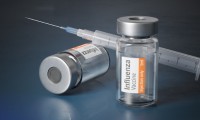-
Bayer christens $250M cell therapy ‘launch facility’ in Berkeley
- Source: drugdu
- 142
- October 12, 2023
-
Already Partnered With Nvidia and Eli Lilly, Iambic Adds $100M for AI Drug Discovery
- Source: drugdu
- 227
- October 6, 2023
-
Community Colleges Help Address Skills Gap
- Source: drugdu
- 191
- October 3, 2023
-
BeiGene and Nona Biosciences expand collaboration for antibody discovery
- Source: drugdu
- 205
- September 21, 2023
-
Danco takes mifepristone restrictions lawsuit to the Supreme Court
- Source: drugdu
- 100
- September 12, 2023
-
Vir’s GSK-Backed Flu Vaccine Candidate Fails Phase II Trial
- Source: drugdu
- 151
- July 25, 2023
-
Pfizer Inks Potential $7B Deal with Flagship to Deepen Pipeline
- Source: drugdu
- 104
- July 20, 2023
-
Fighting AMR with a Value and Subscription Model
- Source: drugdu
- 145
- July 19, 2023
-
UAE, Saudi Arabia Serve as Gateway to International Markets for Biopharma
- Source: drugdu
- 149
- July 13, 2023
-
Labcorp forms spin-off of Fortrea
- Source: drugdu
- 113
- July 6, 2023
your submission has already been received.
OK
Subscribe
Please enter a valid Email address!
Submit
The most relevant industry news & insight will be sent to you every two weeks.













